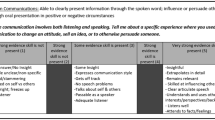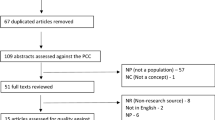Abstract
Purpose
U.S. medical schools pivoted to sustain clinical learning during the pandemic. Formative feedback via student–mentor teleconference persisted as students resumed in-person clinical learning. We aimed to assess timely completion of assignments, student satisfaction, and career interest with and without a formal telementorship program.
Methods
Students in the Surgery clerkship July 2021–January 2022 received a faculty mentor assignment (FMA) at each orientation. Those in May 2020–July 2021 comprised a historical cohort (HC). Each FMA student was advised to teleconference with their mentor mid-clerkship and feedback was documented. HC students sought mid-clerkship feedback from faculty ad libitum, and faculty submitted paper evaluations. FMA students received surveys of satisfaction with the telementorship system. At clerkship end, both groups received surveys of satisfaction with ability to share concerns anonymously, perceived value of reporting concerns, timeliness of the clerkship’s response, and surgical career interest. We compared FMA and HC proportions completing required assignments before the grading deadline, satisfied with feedback processes, and interested in surgery.
Results
Each clerkship, HC students received evaluations from at least 26 faculty members, and the FMA student cohort was assigned 12–16 faculty mentors. All FMA students completed assignments on time. Most in the FMA group (72%) reported satisfaction in discussing career goals via teleconference. Comparing groups, two satisfaction trends favored FMA but were not statistically significant.
Conclusions
Formal telementorship was associated with 100% completion of Surgery clerkship assignments in time for grading. This format allows for effective guidance in completing objectives, discussing student goals (independent of career interest), and providing bidirectional feedback to inform program-wide quality assessment.
Similar content being viewed by others
Data availability
The datasets generated during and/or analyzed during the current study are available from the corresponding author on reasonable request.
References
Shin TH, Klingler M, Han A, et al. (2020) Efficacy of Virtual Case-Based General Surgery Clerkship Curriculum During COVID-19 Distancing. Med Sci Educ. Published online November 10:1–8. https://doi.org/10.1007/s40670-020-01126-5
Chandrasinghe PC, Siriwardana RC, Kumarage SK, et al. A novel structure for online surgical undergraduate teaching during the COVID-19 pandemic. BMC Med Educ. 2020;20(1):324. https://doi.org/10.1186/s12909-020-02236-9.
Schumm MA, Dacey MJ, Moore AM, et al. A hybrid remote surgery clerkship curriculum during the COVID-19 pandemic: lessons learned and future perspectives. Am J Surg. 2022;223(5):1017–8. https://doi.org/10.1016/j.amjsurg.2021.11.007.
Functions and Structure of a Medical School. Published online March 2022. https://lcme.org/wp-content/uploads/2022/07/2023-24_Functions-and-Structure_2022-03-31.docx
Shaughness G, Georgoff PE, Sandhu G, et al. Assessment of clinical feedback given to medical students via an electronic feedback system. J Surg Res. 2017;218:174–9. https://doi.org/10.1016/j.jss.2017.05.055.
Garner MS, Gusberg RJ, Kim AW. The positive effect of immediate feedback on medical student education during the surgical clerkship. J Surg Educ. 2014;71(3):391–7. https://doi.org/10.1016/j.jsurg.2013.10.009.
Coe TM, McKinley SK, Hamdi I, et al. The Big Sibling program: Impact of a medical student-resident mentorship program during the surgery clerkship. Am J Surg. 2023;225(4):650–5. https://doi.org/10.1016/j.amjsurg.2022.07.009.
AD Geary, IM. Pernar L, Chugh PV, Carter CO (2020) Evaluation of a preceptorship model on third-year general surgery clerkship, J Am College Surg 230(6): 957 https://doi.org/10.1016/j.jamcollsurg.2020.03.033
Pointer DT, Freeman MD, Korndorffer JR, Meade PC, Jaffe BM, Slakey DP. Choosing surgery: identifying factors leading to increased general surgery matriculation rate. Am Surg. 2017;83(3):290–5.
Zhou Z, Mims T, Dugan A, Trott T, Sanderson W, Bronner J. Randomized evaluation of videoconference meetings for medical students’ mid-clerkship feedback sessions. West J Emerg Med. 2019;20(1):163–9. https://doi.org/10.5811/westjem.2018.10.39641.
McKinley SK, Kochis M, Cooper CM, et al. Medical students’ perceptions and motivations prior to their surgery clerkship. Am J Surg. 2019;218(2):424–9. https://doi.org/10.1016/j.amjsurg.2019.01.010.
Acker R, Healy MG, Vanderkruik R, Petrusa E, McKinley SK, Phitayakorn R. Eyes of the Beholders: First-year medical students’ perceptions of surgeons and the field of surgery. Am J Surg. Published online October 27, 2021. https://doi.org/10.1016/j.amjsurg.2021.10.019
Hill EJR, Bowman KA, Stalmeijer RE, Solomon Y, Dornan T. Can I cut it? Medical students’ perceptions of surgeons and surgical careers. Am J Surg. 2014;208(5):860–7. https://doi.org/10.1016/j.amjsurg.2014.04.016.
Kochis M, Jogerst K, McKinley SK, Sandler M, Petrusa ER, Phitayakorn R. “Fighting an uphill battle”: A mixed methods exploration of surgeon involvement in medical schools’ preclinical curricula. Am J Surg. 2021;221(2):315–22. https://doi.org/10.1016/j.amjsurg.2020.10.034.
Zambare WV, Dechert TA, Sanchez SE, Brahmbhatt TS. Changes in medical student perceptions of surgery are sustainable through focused preclinical surgical exposure. J Surg Educ. 2021;78(5):1583–92. https://doi.org/10.1016/j.jsurg.2021.02.008.
Whittaker LD, Estes NC, Ash J, Meyer LE. The value of resident teaching to improve student perceptions of surgery clerkships and surgical career choices. Am J Surg. 2006;191(3):320–4. https://doi.org/10.1016/j.amjsurg.2005.10.029.
Patel MS, Khalsa B, Rama A, et al. Early intervention to promote medical student interest in surgery and the surgical subspecialties. J Surg Educ. 2013;70(1):81–6. https://doi.org/10.1016/j.jsurg.2012.09.001.
Kozar RA, Lucci A, Miller CC, et al. Brief intervention by surgeons can influence students toward a career in surgery. J Surg Res. 2003;111(1):166–9. https://doi.org/10.1016/S0022-4804(03)00104-5.
Lefroy J, Watling C, Teunissen PW, Brand P. Guidelines: the do’s, don’ts and don’t knows of feedback for clinical education. Perspect Med Educ. 2015;4(6):284–99. https://doi.org/10.1007/s40037-015-0231-7.
Burgess A, van Diggele C, Roberts C, Mellis C. Feedback in the clinical setting. BMC Med Educ. 2020;20(2):460. https://doi.org/10.1186/s12909-020-02280-5.
Tuma F, Nassar A k. Feedback in Medical Education. In: StatPearls. StatPearls Publishing; 2023. Accessed May 27, 2023. http://www.ncbi.nlm.nih.gov/books/NBK544311/
Kost A, Phillips JP, Polverento ME, et al. The influence of role modeling and mentorship on primary care career choice: what can be gleaned from 30 years of research? Fam Med. 2022;54(7):555–63. https://doi.org/10.22454/FamMed.2022.980735.
Day KM, Schwartz TM, Rao V, et al. Medical student clerkship performance and career selection after a junior medical student surgical mentorship program. Am J Surg. 2016;211(2):431–6. https://doi.org/10.1016/j.amjsurg.2015.10.007.
Hao KA, Fu S, Islam S, et al. Medical student career choice: Who is the influencer? J Surg Res. 2022;272:9–16. https://doi.org/10.1016/j.jss.2021.11.007.
Berger AP, Giacalone JC, Barlow P, Kapadia MR, Keith JN. Choosing surgery as a career: early results of a longitudinal study of medical students. Surgery. 2017;161(6):1683–9. https://doi.org/10.1016/j.surg.2016.12.016.
Ramani S, Gruppen L, Kachur EK. Twelve tips for developing effective mentors. Med Teach. 2006;28(5):404–8. https://doi.org/10.1080/01421590600825326.
Watling C, Driessen E, van der Vleuten CPM, Lingard L. Learning from clinical work: the roles of learning cues and credibility judgements. Med Educ. 2012;46(2):192–200. https://doi.org/10.1111/j.1365-2923.2011.04126.x.
Russel SM, Geraghty JR, Kobayashi KR, et al. Evaluating core clerkships: lessons learned from implementing a student-driven feedback system for clinical curricula. Acad Med. 2021;96(2):232–5. https://doi.org/10.1097/ACM.0000000000003760.
Acknowledgements
None.
Funding
This study was funded by the 2021 CESERT Association for Surgical Education Foundation (ASEF) Grant #2021-ASEF-G4.
Author information
Authors and Affiliations
Contributions
All authors contributed to the study conception and design. Material preparation, data collection and analysis were performed by Ivy Huang, Ian MacQueen, and Justin Wagner. The first draft of the manuscript was written by Ivy Huang and all authors commented on previous versions of the manuscript. All authors read, edited, and approved the final manuscript.
Corresponding author
Ethics declarations
Conflict of interest
The authors have no relevant financial or non-financial interests to disclose.
Ethics approval
Approval was obtained from the University of California Los Angeles Institutional Review Board (UCLA IRB) under IRB #20-000943. The procedures used in this study adhere to the tenets of the Declaration of Helsinki.
Informed consent
A waiver of signed informed consent was granted as the research was deemed minimal risk.
Supplementary Information
Below is the link to the electronic supplementary material.
Rights and permissions
About this article
Cite this article
Huang, I.A., Ghosh, D., MacQueen, I.T. et al. Telementorship, feedback, and completion of assignments in the post-pandemic surgery clerkship. Global Surg Educ 2, 90 (2023). https://doi.org/10.1007/s44186-023-00165-x
Received:
Revised:
Accepted:
Published:
DOI: https://doi.org/10.1007/s44186-023-00165-x




